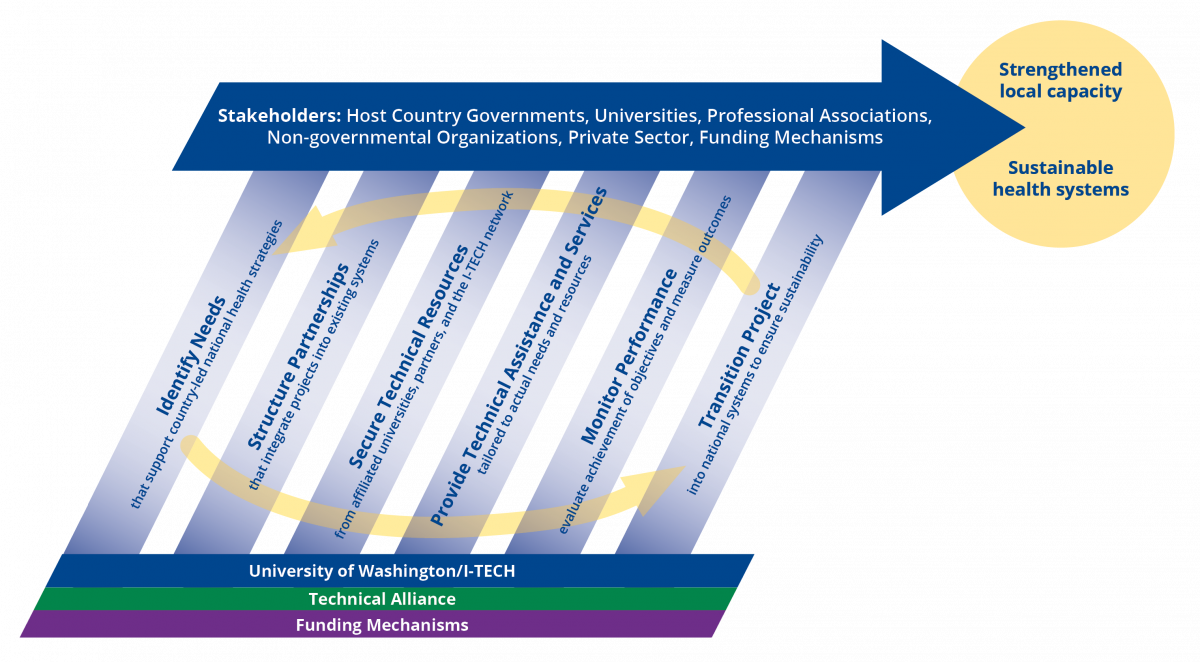As a key member of the Kenya electronic medical record (EMR) system technical working group, I-TECH works to implement and standardize the EMR systems used in the management of national HIV and AIDS care and treatment data. Similar efforts have focused on ensuring that different electronic systems can communicate with one another (interoperability) and that health care workers, administrators, and staff are well trained to use and maintain them.
Category: Nancy Puttkammer
Health Information Systems in Kenya
In 2012, I-TECH designed and developed an electronic medical records (EMR) system, KenyaEMR, to support the care and treatment of HIV/AIDS. KenyaEMR is built on the OpenMRS platform. I-TECH supported the implementation of KenyaEMR in over 300 health facilities throughout Kenya—one of the largest open source EMR rollouts in Africa.
Best Practices
To address the UNAIDS Sustainable Development Goals for elimination of HIV/AIDS, tuberculosis, malaria and other diseases by 2030, and the PEPFAR 3.0 goals, I-TECH leverages the technical expertise of its universities and partners, the broad experience of its funders, and best practices from 15 years of implementing programs.
Transition & Sustainability

The International Training and Education Center for Health (I-TECH) works in partnership with host country governments, universities, professional associations, non-governmental organizations, private sector groups and funding agencies to strengthen local capacity and build sustainable health systems.
I-TECH follows a partnership model that guides the provision of technical services and technical assistance toward local ownership and sustainability, creating projects and programs that can be readily transitioned into national systems.
Based at the University of Washington, I-TECH draws upon a strong global network of public health professionals. The approach described in this document is customized in each country to respond to local needs and priorities. In addition, each I-TECH country office team aligns the model with the unique Partnership Framework Implementation Plans of the partner host government.
1. IDENTIFY NEEDS in consultation with host country governments
I-TECH works with host country governments to assess existing health systems and identify specific areas where the delivery of health care could be improved. This early collaboration helps to ensure that technical assistance accurately reflects the country’s specific health strategies and priorities.
2. STRUCTURE PARTNERSHIPS that integrate projects into existing systems
In each partnership, I-TECH develops roles, responsibilities, and timelines based on a long-term vision of integrating projects into existing national systems. As part of this vision, I-TECH recognizes and leverages the strengths and resources of national systems, building on and maximizing these efficiencies. The partnerships that emerge are attuned to the needs, realities, and structure of host country systems. Thus, they build and maintain lasting capacity within host country systems, maximize cost-effectiveness, and produce projects that can be more readily scaled up to meet national goals.
3. SECURE TECHNICAL RESOURCES from affiliated universities, partners, and the I-TECH network
As a center based at the University of Washington, I-TECH has direct access to a wide variety of technical specialists. In addition, I-TECH draws upon a robust global network of locally based public health professionals. These specialists provide a wide range of technical expertise to meet project needs.
4. PROVIDE TECHNICAL ASSISTANCE AND SERVICES tailored to actual needs and resources
I-TECH is committed to technical services and technical assistance approaches that build upon and support the existing strengths of local health systems. In addition, I-TECH prioritizes the use of local and regional expertise, an approach that builds the capacity of local experts to meet locally determined needs.
5. MONITOR PERFORMANCE; evaluate achievement of objectives and measure outcomes
I-TECH implements projects within a quality improvement framework designed to track progress in institutional capacity building and guide successful implementation. Using the framework, implementers monitor the progress of each project against specific benchmarks of success; for example, the progressive transfer of skills and capacity to local institutions. This methodology ensures that objectives are met and provides data to adjust approaches as projects evolve.
6. TRANSITION PROJECT into national systems to ensure sustainability
The ultimate goal of I-TECH’s partnership model is to improve health outcomes by strengthening local capacity and building sustainable health systems. I-TECH’s technical services and technical assistance are tailored from the initial planning stage to produce projects that can be successfully absorbed into national systems within mutually determined and realistic timeframes. Recognizing that a successful transition takes time, I-TECH offers transition support in a variety of technical areas including quality improvement and grant management.
Tuberculosis
To reduce the number of new cases of tuberculosis and improve diagnosis and treatment, I-TECH collaborates with governments and ministries of health to strengthen their health systems through facilitating trainings, advising on health policy and clinical guideline updates, supporting laboratory quality management, upgrading national health information systems, and implementing integrated TB/HIV care and treatment services.
Program Highlights
Malaria
Program Highlights
HIV Co-infection
Program Highlights
HIV Care and Treatment
I-TECH provides technical assistance on the clinical care and treatment of HIV and related opportunistic infections on a continuum that ranges from direct patient service delivery, to training and mentoring health care workers, to the development of national policies and health systems infrastructure. In particular, together with ministries of health and other key stakeholders, I-TECH has developed numerous curricula and clinical mentoring programs to train health care workers to safely and effectively treat patients who have HIV and TB or other opportunistic infections at a level of care commensurate with national and international standards.
I-TECH has also assisted ministries of health to create national prevention and care and treatment guidelines for infectious diseases, which has lead to standardized care and treatment for HIV, including antiretroviral therapy (ART) dosing for adults and children.
Program Highlights
Quality Improvement
I-TECH’s quality improvement approach emphasizes ongoing assessments of program aims and operations. Country projects apply continuous quality improvement (CQI) strategies targeting both programmatic and management activities. Small-scale, practical Plan-Do-Study-Act (PDSA) cycles are used to construct improvement goals, test proposed changes, and implement adjustments, leading to increased quality of operations, service delivery, and care.